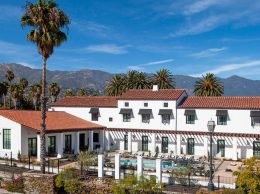$100M Nesbitt hotel portfolio files Chapter 11
IN THIS ARTICLE
- Real Estate Topic
- Marlize van Romburgh Author
By Marlize van Romburgh Friday, August 10th, 2012
Santa Barbara hotelier Patrick Nesbitt has placed a portfolio of eight Embassy Suites hotels into Chapter 11 bankruptcy, listing at least $100 million in debts.
The bankruptcy filing, which gives Nesbitt’s companies protection from creditors while they restructure their debts, arises from a dispute with a lender over a $187.5 million loan used to refinance the hotels in 2006. Profits on the hotels have fallen drastically, but the bank’s loan servicer has refused to budge on repayment, according to court filings.
“We pay our bills. We have not had any interruptions with our vendors or staff,” Craig Stechman, senior vice president of sales and marketing for Windsor Capital Group, which manages the hotels, told the Business Times. “This gives us time to restructure our debt and this gives us time to put together a package to renovate the properties.”
The filings in U.S. Bankruptcy Court in Santa Barbara are for Embassy Suites hotels in Tigard, Ore.; Bellevue and Lynnwood, Wash.; El Paso, Texas; Denver and Colorado Springs, Colo.; Livonia, Mich.; and Cincinnati.
The hotels require about $50 million in renovations in order to renew their license agreements with Hilton Hotel Corp., the parent company of Embassy Suites, according to bankruptcy court documents.
A spokeswoman for Embassy Suites did not respond to requests for comment for this story. Nesbitt did not return phone and email requests for comment.
Santa Monica-based Windsor manages 22 hotels in 11 states and is the largest private owner-operator of Embassy Suites properties in the U.S. Nesbitt, 67, founded the company in 1974 and remains its CEO and chairman.
The eight Embassy Suites hotels that filed for bankruptcy make up a loan portfolio that was refinanced in early 2006 with a $187.5 million loan from Greenwich Capital Products, according to a court declaration submitted by Nesbitt.
The loan is now held in a securitization trust administered by U.S. Bank, a spokeswoman for the lender confirmed in an email to the Business Times. “As trustee, our role is purely administrative,” she said, referring further requests for comment to Torchlight Loan Services, the loan servicer. Torchlight did not return requests for comment.
The loan matured in February 2011, but Nesbitt said in filings that he tried to start talks with Torchlight to refinance or modify the debt 14 months earlier.
“This hotel portfolio, like the economy in general, and the hotel industry in particular, has been devastated by the serious economic downturn that occurred in 2008,” Nesbitt said in court filings. Net income for the eight-hotel portfolio fell from $22 million to $13 million in 2009, he said.
Matt Marquis, the president and chief operating officer of Santa Barbara-based Invest West Financial Corp., said hoteliers everywhere felt the sting of the 2008 recession. “There was a general crash where everybody felt anywhere from a 25 to 35 percent downturn,” he said.
Invest West owns 27 hotels, mostly Best Western and independently flagged properties managed by its sister firm, Pacifica Hotel Co. Because it operates largely on the coast, where the recession was felt less acutely, Invest West’s portfolio has rebounded nicely, Marquis said. “But there are still pockets of the country that are difficult,” he said. Most of the Windsor properties in bankruptcy are located in inland cities.
Marquis said all-suites hotels such as Embassy Suites are generally good investments. “The all-suite hotel is a great product,” he said. “Residence Inn by Marriott and Embassy Suites — those generally do quite well.”
Faceoff with Torchlight
Nesbitt alleges that his attempts to start loan modification talks with Torchlight, the loan servicer, were rebuffed for more than a year. “Finally, in October 2010, four months in advance of the loan maturity date, we convinced Torchlight to begin discussions about refinancing the loan,” he said in his filing.
Talks lasted for more than a year, he said, until the lenders, through Torchlight, sued in federal district court in New York. Torchlight asked the court to appoint a receiver to take over day-to-day management of the hotels.
Stechman told the Business Times that “one of the positive outcomes” of the bankruptcy filing is that it has halted those proceedings, meaning that the hotel management remains with Windsor.
For guests and employees, it’s largely “business as usual,” he said. “Nothing has changed before, during or even after the filing.”
The properties do need substantial renovations, a job with an estimated price tag of about $50 million, in order to renew their franchise licenses with Hilton, according to court documents. The licenses for five of the eight properties comes up for renewal in September.
The bankruptcy filing stops the termination of the franchise agreements, according to Nesbitt’s filing. He said he has several lenders lined up who “have expressed a willingness to provide the full financing” for the needed renovations. Those lenders are Wells Fargo Bank, JP Morgan, Deutsche Bank, Lowe Investments and LoanCore Financial, according to his filing.
Windsor is asking the bankruptcy court to order Torchlight to release about $4 million in capital reserves it alleges the loan servicer won’t hand over. Those funds would allow Windsor to do some of the renovation work, the firm said.
Turf matches
Nesbitt orbits in wealthy circles in Santa Barbara and is an avid polo player who sometimes hosts nonprofit and Republican fundraising events at his 20-acre Summerland estate.
Company lore has it that he was an enterprising teenager who started rehabilitating homes in his native Detroit at age 13. “I have been constantly involved in some aspect of the real estate business for more than fifty-four years,” Nesbitt said in his court declaration. He started managing hotels in the 1970s, he said, when the all-suite hotel concept was first hatched.
“Initially, I did site location work for Granada Royal Hometels, the predecessor of Embassy Suites Hotels, and developed one of the original Embassy Suites hotels. I have literally grown up with the Embassy Suites brand ever since,” Nesbitt said in the court document.
Locally, Windsor owns and operates the Embassy Suites hotels in Lompoc and San Luis Obispo, but those properties are not part of the portfolio in the bankruptcy proceedings.
Nesbitt has been in other contentious disputes with lenders in recent years. Last year, he rescued 18 of his hotels just before they were slated to land on the foreclosure auction block by lining up $165 million in last-minute financing. The fresh capital headed off an auction that could have ceded control of a large chunk of Nesbitt’s holdings to competitor John Eilian of Atrium Hotels.
“Since this has been going on, I haven’t been able to ride at all,” Nesbitt told the Wall Street Journal in March 2011, when that dispute was resolved. “I’m looking forward to bringing the ponies back out from pasture and doing some riding.”
Nesbitt built the Bella Vista Polo Club on the grounds of his sprawling Summerland mansion in 1999, according to a listing on the United States Polo Association’s website. He was one of the polo players who faced off against Prince William when the Duke of Cambridge and his wife, Kate Middleton, stopped in Santa Barbara on a whirlwind honeymoon trip through California last year. The price to play with the prince in the charity match was anywhere from $60,000 to $100,000 per person, according to media reports at the time.
[EDITOR’S NOTE: This story is an updated and expanded version of the online story published Aug. 2, 2012.]










